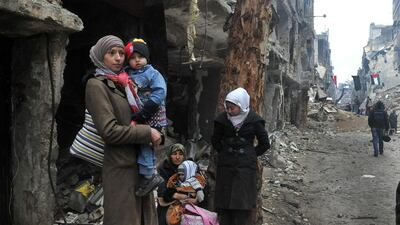To judge by media coverage, the conflicts in the Middle East are all sectarian – they are fights between competing religions or between sects within the same religion. While this might provide a simple key to understanding a ferociously complex situation, it obscures as much as it enlightens.
While sectarian feelings have been rising since the US-led invasion of Iraq in 2003, this is not the whole story. Sectarianism is usually the result, not the cause, of a wide variety of tensions – between states, tribes, regional identities, classes and ethnic groups, or between the haves and the have-nots in society. These tensions exist throughout the world. The question is why they have become unmanageable in the Middle East.
There are plenty of examples of civil conflict in the Arab world with no sectarian divide. Libya is being torn apart by fighting between the armed groups that toppled Muammar Qaddafi over who controls the oil resources. Egypt has been in crisis due to a political struggle for control of the state between the army and its backers on the one side and proponents of political Islam on the other. There are many political and economic interests involved, but no sects.
As for Yemen, where rebels of the Zaydi sect of Islam have taken over the capital and are fighting for control of the city of Aden, this is indeed a perennially unstable country, which yokes together peoples with different histories. But the sectarian element should not be exaggerated: Houthi rebels would not have got so far without the support of the former president, Ali Abdullah Saleh, who is angling to return to power, or at least show that the country is ungovernable without him pulling the strings. Nor would the Houthi advance have aroused so much attention without the fact that the rebels have the support of Iran. This gives the conflict a geopolitical narrative – a Shia power perhaps gaining a foothold in the Arabian Peninsula, the stronghold of the Sunni powers led by Saudi Arabia.
Similarly Iran’s support of the beleaguered regime of president Bashar Al Assad has prolonged the Syrian war into its fifth year. What began as peaceful protests against the incompetence of the regime has become a sectarian recruiting sergeant for extreme Sunni jihadists.
The Levant has for centuries been a patchwork of different sects that have survived far longer than in supposedly more tolerant Europe. Sectarian sentiment changed dramatically after the 2003 invasion of Iraq. Apparently it did not occur to the Americans that democracy might put the majority Shia in power and draw Iraq into the Iranian sphere of influence.
The growth of Shia power and Iranian influence in Iraq coincided with a parallel process in Lebanon: the rise of the Iranian-backed Hizbollah armed militia and a vacuum in the Sunni leadership after the assassination of Rafiq Hariri, the former prime minister. Crucially, this happened just as social media was exploding in the Arab world. This gave a pan-Arab voice to salafists to denounce the weakness of the Arab states in the face of a rampant Iran and the Hizbollah clones it was creating.
The idea that the Shiites were about to slit the throats of the Sunnis around the world – as happened in Baghdad during the years when the city was divided on sectarian grounds – is ludicrous.
In the region as a whole, the Sunnis far outnumber the Shiites. But still the rise of Iran and its manipulation of Shiite populations to further the ends of the Iranian regime gave a fiercer sectarian colouring to the interstate rivalry between Iran and Saudi Arabia.
How could it come about that during the 36 years since the Iranian revolution when America has spared no effort to weaken Iran, the result has been so contradictory? The US-Iranian cold war has given comfort to the Sunni Arab states as Washington’s preferred ally, but paradoxically allowed Iran to extend its influence.
That is changing. The Washington-Tehran cold war is thawing. This means that the Sunni Arab states are no longer Washington’s only interlocutor in the Gulf. This will usher in a complex diplomatic environment, and require a far higher level of statecraft.
Peter Beinart, the American commentator, has written that the end of the US-Iranian confrontation should allow the region’s proxy wars to be consigned to history, just as the conflicts that ravaged Angola and El Salvador during the US-Soviet contest petered out when the Kremlin folded.
This may be wishful thinking. Sectarian identity is stronger than a preference for communism. This is particularly true once sectarian narratives have taken hold. It is in the affluent sections of society that sectarian identities are dissolved by class affiliation, most obviously in Baghdad under Saddam Hussein, where mixed Sunni-Shia marriages were common. But the conflicts in Syria and Iraq have devastated the middle classes, pushing back integration by decades.
Sectarian identity has risen as the contest between Iran and the Sunni Arab states has become more acute. These rivalries will not go away.
The end of the era when America was determined to keep Iran down, while failing spectacularly to achieve this goal, should provide a chance to contain these interstate contests, and eventually reduce the appeal of sectarian identities.
Alan Philps is a commentator on global affairs.
On Twitter @aphilps

